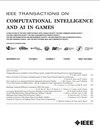Creating Affective Autonomous Characters Using Planning in Partially Observable Stochastic Domains
Q2 Computer Science
IEEE Transactions on Computational Intelligence and AI in Games
Pub Date : 2017-03-01
DOI:10.1109/TCIAIG.2015.2494599
引用次数: 5
Abstract
The ability to reason about and respond to their own emotional states can enhance the believability of Non-Player Characters (NPCs). In this paper, we use a Partially Observable Markov Decision Process (POMDP)-based framework to model emotion over time. A two-level appraisal model, involving quick and reactive vs. slow and deliberate appraisals, is proposed for the creation of affective autonomous characters based on POMDPs, wherein the probability of goal satisfaction is used in an appraisal and reappraisal process for emotion generation. We not only extend Probabilistic Computation Tree Logic (PCTL) for reasoning about the properties of emotional states based on POMDPs but also illustrate how four reactive (primary) emotions and nine deliberate (secondary) emotions can be derived by combining PCTL with the belief-desire theory of emotion. The results of an empirical study suggest that the proposed model can be used to create characters that appear to be more believable and more intelligent.在部分可观测随机域中使用规划创建情感自主角色
推理和回应自己情绪状态的能力可以增强非玩家角色(NPC)的可信度。在本文中,我们使用一个基于部分可观测马尔可夫决策过程(POMDP)的框架来对情绪随时间的变化进行建模。基于POMDP,提出了一种两级评估模型,包括快速和反应性评估与慢速和深思熟虑的评估,用于创建情感自主角色,其中目标满意度的概率用于情感生成的评估和重新评估过程。我们不仅扩展了概率计算树逻辑(PCTL)来推理基于POMDP的情绪状态的性质,而且还说明了如何将PCTL与情绪的信念-欲望理论相结合来导出四种反应性(主要)情绪和九种故意(次要)情绪。一项实证研究的结果表明,所提出的模型可以用来塑造看起来更可信、更聪明的角色。
本文章由计算机程序翻译,如有差异,请以英文原文为准。
求助全文
约1分钟内获得全文
求助全文
来源期刊

IEEE Transactions on Computational Intelligence and AI in Games
COMPUTER SCIENCE, ARTIFICIAL INTELLIGENCE-COMPUTER SCIENCE, SOFTWARE ENGINEERING
CiteScore
4.60
自引率
0.00%
发文量
0
审稿时长
>12 weeks
期刊介绍:
Cessation. The IEEE Transactions on Computational Intelligence and AI in Games (T-CIAIG) publishes archival journal quality original papers in computational intelligence and related areas in artificial intelligence applied to games, including but not limited to videogames, mathematical games, human–computer interactions in games, and games involving physical objects. Emphasis is placed on the use of these methods to improve performance in and understanding of the dynamics of games, as well as gaining insight into the properties of the methods as applied to games. It also includes using games as a platform for building intelligent embedded agents for the real world. Papers connecting games to all areas of computational intelligence and traditional AI are considered.
 求助内容:
求助内容: 应助结果提醒方式:
应助结果提醒方式:


